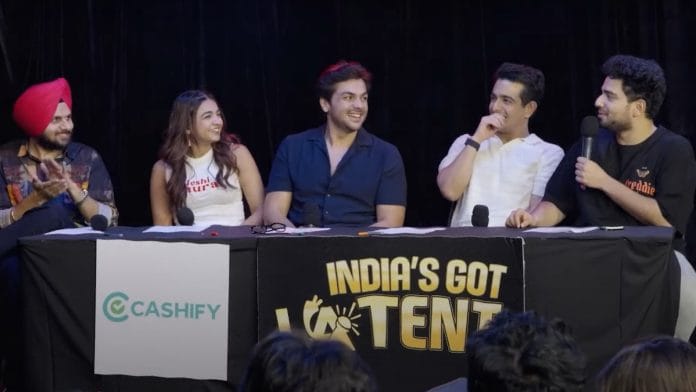New Delhi: The Supreme Court Thursday directed comedian Samay Raina, podcaster Ranveer Allahbadia and other performers to organise at least two fundraisers each month to raise funds for the treatment of persons with disabilities, as amends for mocking them on the show ‘India’s Got Latent’ earlier this year.
A bench led by Chief Justice of India (CJI) Surya Kant and Justice Joymalya Bagchi passed the order in a bid to link digital accountability with social responsibility, even as it examined the wider regulatory challenges posed by unmonitored online content.
“We don’t want to impose a penal burden, but you must discharge a social responsibility,” the CJI said.
The direction was in connection with two linked matters—one concerning insensitive remarks about persons with disabilities, and another dealing with the “social harm” caused by user-generated content on YouTube.
The CJI-led bench passed the fundraising order while hearing a plea by Cure SMA India Foundation, which had sought action against online content that violates the dignity and right to life of persons with disabilities. The court simultaneously continued its scrutiny of the petitions filed by Allahbadia and others on the larger question of accountability in digital media.
Raina and Allahbadia, amongst others, are facing multiple FIRs for making inappropriate remarks on ‘India’s Got Latent’. The content creators wanted these FIRs—registered in different states—to be clubbed, for which they had approached the apex court.
Cure SMA India Foundation had accused Raina of ridiculing a person with disability and making insensitive remarks about the high cost of treatment of spinal muscular atrophy (SMA), a genetic disorder that causes progressive muscle weakness. Similar allegations have been raised against other comedians involved in the case.
The remarks on ‘India’s Got Latent’ had sparked a debate about the freedom of speech and questions around how far comedy shows can push the envelope at the risk of insensitivity.
Also Read: Hearing ‘India’s Got Latent’ case, SC says right to dignity greater than right to free speech
‘Persuade & invite’
The apex court recorded that Raina, Vipul Goyal, Balraj Paramjeet Singh Ghai, Sonali Thakar alias Sonali Aditya Desai, and Nishant Jagdish Tanwar had already volunteered to conduct events to raise money for SMA treatment and had sought permission to share success stories of persons with disabilities.
After previously directing them to issue public apologies on their platforms, the Supreme Court Thursday ordered them “to persuade and invite specially abled persons on their platforms to promote the cause of generating funds to provide timely treatment to specially abled including those suffering from SMA”.
The bench said it was confident that if the comedians showed “sincerity” in presenting the achievements of disabled persons, “they will also come on the platform for wider publicity of their cause”.
“We hope and expect that such a few memorable events will take place before we hear the matter on the next date. Let such two programs be held twice a month,” the court said.
Also Read: Moral panic over Ranveer Allahbadia comes from India’s family hierarchy
New norms for online content soon?
During the hearing, the bench also deliberated on the wider regulatory vacuum surrounding user-generated content, a concern emerging from the present case.
Calling attention to the unregulated nature of digital content creation, CJI Kant remarked, “So I create my own channel, I am not accountable to anyone… somebody has to be accountable.” He said it was “strange” that individuals can launch channels without any institutional scrutiny.
Solicitor General Tushar Mehta warned that the concerns went beyond legal obscenity.
Attorney General R. Venkataramani and Solicitor General Mehta informed the court that the Union government is finalising new guidelines for online content and is currently engaged in stakeholder consultations.
Senior Advocate Amit Sibal, representing the Indian Broadcast and Digital Foundation (IBDF), argued that existing frameworks—such as the Information Technology (Intermediary Guidelines and Digital Media Ethics Code) Rules, 2021—already provide structure, and that OTT platforms continue to follow age ratings and labelling requirements. A self-regulatory grievance redressal body for complaints arising out of OTT content, headed by Justice (Retd.) Gita Mittal, is also active, he said.
But Justice Bagchi raised doubts about whether self-regulation was adequate to counter harmful or destabilising content.
The bench noted the consequences of instant virality of objectionable content and said: “Once the scurrilous material is uploaded, by the time the authorities react, it has gone viral.”
Advocate Prashant Bhushan, who represented a disabled professor, warned about the vagueness of terms like “anti-national”, which he said could be misused.
The CJI reiterated that adult-oriented content must include “warnings in advance”, parental controls, and robust age verification. The court suggested that the government release draft guidelines, invite public feedback, and form an expert committee with judicial and domain specialists.
The CJI also said the court may choose not to impose fines if creators propose donating to a reputable institution. He warned that digital behaviour is being closely monitored: “Someone was making comments in Canada also—we know all of this.”
(Edited by Shashank Kishan)
Also Read: What should the government do to Ranveer Allahbadia? Nothing






